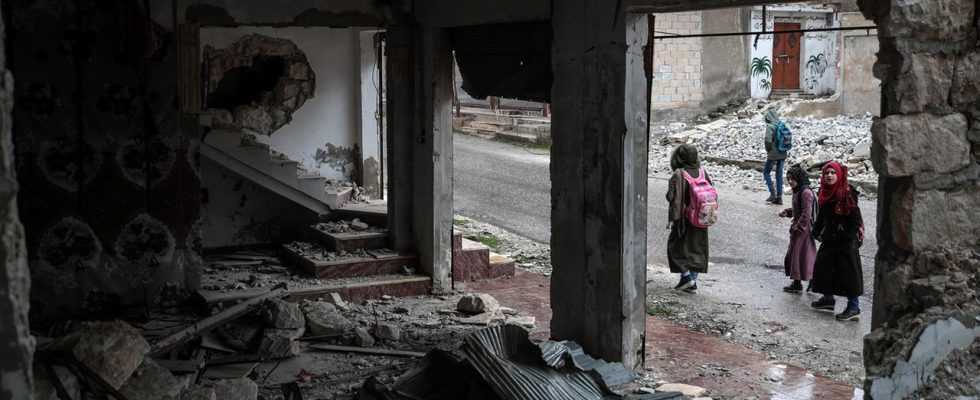exclusive
The Interior Ministry is examining how asylum seekers who have committed criminal offenses can be deported back to Syria. But according to a confidential report from the Foreign Office, a safe return is still “not guaranteed”.
It is now almost 13 years since Syria’s ruler Bashar al-Assad began a momentous war against the Syrian population. Since then, it is estimated that half a million people have died in the clashes.
More than ten million Syrians are said to have fled within the country or abroad. Around 800,000 people came to the Federal Republic over the years. A possible return home, according to information from NDR and WDRwould apparently still be anything but safe for them today.
In its updated asylum situation report for Syria, the Federal Foreign Office warns of great dangers in deportations or voluntary returns: “A safe return of refugees cannot currently be guaranteed, predicted or even verified for any region of Syria and for no group of people,” it says in the 32nd report. page document.
There is talk of a “catastrophic humanitarian, economic and human rights situation in large parts of the country.” Returnees’ “personal security” is threatened because the regime often declares them to be traitors and they are therefore “often confronted with far-reaching systematic arbitrariness and even complete lack of rights.”
100,000 people missing
The analysis is largely drastic: In the letter from the beginning of February, Foreign Minister Annalena Baerbock (Greens) states that the “systematic persecution” of opposition groups and other critics of the regime and enemies of the regime continues “unchanged”.
Arbitrary arrests “often followed by solitary confinement” are a “ubiquitous phenomenon” – as is the so-called “disappearance” of people. More than 100,000 people are now considered missing in Syria, most of them men.
The analysis also comes to the conclusion that one cannot currently speak of individual safe regions within Syria. Overall, “reliable statements or forecasts on return issues based on geographical criteria still cannot be made.” Particularly for areas under regime control, it remains the case that a “reliable assessment of the individual risk situation” is not possible.
BMI is examining possible deportations
The now updated report for Syria comes in the middle of an examination by the Federal Ministry of the Interior into possible deportations and voluntary departures of convicted serious criminals and dangerous people to Syria. The House of Nancy Faeser (SPD) was asked to do this by the federal states at the end of last year as part of the Interior Ministers’ Conference.
The initiative for this came from Saxony-Anhalt – in order to “exploit all legal and actual options to protect its own population,” as the state’s Interior Minister, Tamara Zieschang (CDU), explained at the time.
Upon request, the Federal Ministry of the Interior stated that the current audit would be discussed at the next meeting of the Interior Ministers in the spring. However, it is already becoming apparent that there are different positions in the federal states, even if the order to examine the matter was given unanimously to the federal government.
Federal states are pushing for repatriations
When asked, the Bavarian Ministry of the Interior stated that the state government’s “top priority is to end the stay of criminals, dangerous people and people who have become conspicuous through acts of violence or riots as quickly as possible.” The federal government is regularly called upon to “create the corresponding actual repatriation options to Syria.” According to the responsible Ministry of Justice, Baden-Württemberg has also asked the federal government to allow deportations of dangerous people and some criminals.
There have been no deportations from Germany to Syria for years. In fact, according to the Federal Ministry of the Interior, a total of 829 Syrian citizens were deported in 2023, but only to third countries and not to Syria itself. However, 66 Syrians voluntarily traveled back to their homeland during the period, financed by the BAMF and organized with the respective federal states.
The Lower Saxony Ministry of the Interior says that they want to wait for the result of the Federal Ministry of the Interior’s audit. However, it is clear that the federal states do not have their own knowledge of the asylum and deportation-related situation in the country of origin. This assessment is the responsibility of the federal government.
The North Rhine-Westphalia Ministry of Refugees and Integration takes a clearly negative stance on deportations to Syria: “As long as there is no safe possibility of return for any group of people in any region of Syria, there can be no returns,” it said on request.
“Significant security risks”
The Syrian regime officially assured in a statement in October 2023 that it was creating safe conditions for return. The return of Syrian refugees is an important issue on the way to a political rapprochement with the Syrian regime, especially for Turkey, Lebanon and Jordan.
Nevertheless, according to the Foreign Office’s assessment, the Syrian promise of better return conditions remains vague. The UN refugee agency UNHCR and the International Organization for Migration IOM also continue to take the view that the conditions for the voluntary return of refugees are not met in view of the “significant security risks that continue to exist throughout Syria”.
The last regular asylum situation report for Syria was written in spring 2011. In the wake of the Syrian civil war, the Federal Republic closed its local embassy. Information that has since been included in the updated reports comes from German cooperation with international organizations or from publicly available information sources. Asylum situation reports are used, for example, by the Federal Office for Migration and Refugees (BAMF) or administrative courts when making decisions on asylum applications.
Marcus Engert, NDR, tagesschau, February 20, 2024 6:43 a.m

